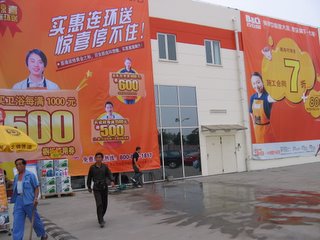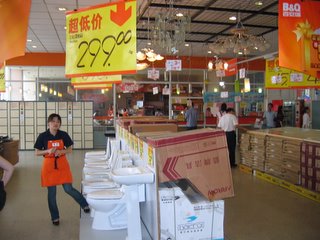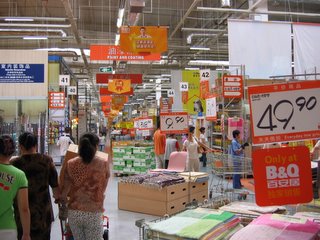Many friends/companies consulted with me in the past on how to do business in China and to create lasting relationship that will yield good ROI. Let me tell you it's not that easy at all. Even for Chinese like myself, we sometimes flounder and fail to achieve mission critical goals. However, this is not to say that you, as a none-Chinese of course, can do nothing. There are common rules and guidelines you can follow to generate better results. Especially when we Chinese treasure Sincerity, Humility, and Humbleness as the base for building trusted relationship, you should go extra miles to make sure that you present youself and your plan in such a way and take time to let things happen naturally. Remember what goes around comes around, and you can never reep more than what you have sewed. And sometimes, finding a good Chinese partner on your team will certainly help and minimize certain misunderstandings.
Following are some of the articles and excepts I usually share with my friends before they land in China. Hope these knowedge and wisdom will help you as well.
Articles you should read:
1.
China Negotiation - Harvard Business Review
2.
The Hidden Dragons - Harvard Business Review
3.
When Good GuanXi Turns Bad - Harvard Business Review
4.
A Better Way to Crack China - Harvard Business Review
5.
Expanding In China - Harvard Business Review
And For VCs who are looking to invest or simply setting up operation in China, following 8 key lessons from Claude Leglise, Vice President of Intel Capital, are very helpful:
Lesson No. 1: Management will be hard to find. China doesn't have the same managerial pool that we take for granted in the United States. CEOs and their direct reports are often returnees who have lived in the United States for five to 10 years, often attending graduate school here. These are typically good, solid business people who understand how American businesses run, how American investors think and how American management techniques work. Unfortunately, China doesn't have many of them, and the best ones routinely move from one company to the next.
Finding middle managers who can translate high-level directions into action is even more difficult. Over centuries of imperial rule and 50 years of centralized planning, China has fostered a culture of hierarchical obedience. Consequently, many Chinese aren't comfortable taking initiative, manifesting itself as a lack of understanding in basic business skills, such as decision-making, cost accounting, project management and time management. Bottom line: Expect to spend a lot of time recruiting and coaching.
Lesson No. 2: Reform is happening, in due time. It's commonly said in China that the country is moving from a centrally planned economy to a "socialist market economy," signaling that it's not the kind of market economy Americans are accustomed to. China's economy is undergoing a major transition that requires the wholesale creation of new regulations, institutions and practices. Many improvements are under way, but betting on future reform as a critical element of a business plan would be dangerous.
The convertibility of China's currency, the Yuan (formally the "Renminbi"), offers a classic example. The Yuan is now pegged to the U.S. dollar at a ratio that many consider undervalues the Yuan relative to other currencies. Although the U.S. government is making a lot of noise, and some believe that China's government will allow the Yuan to float, either freely or at least within a widened band, by the time Beijing hosts the Olympics in 2008, VCs would be unwise to invest with the expectation that this policy will change in a certain time frame.
Lesson No. 3: Learn to enjoy midnight board meetings. Working with people 13 to 16 time zones away means changing work habits. Be prepared for a different style of interaction with the CEO and other company leaders, and factor in a lot more travel than most VCs are accustomed to. Expect also that the difficulty of reaching consensus and alignment between the board and management on strategic and tactical matters will increase with distance, language and time differences.
Lesson No. 4: Fashion is the enemy of valuation. China has seen a heavy influx of foreign venture capital in the past year-mostly from the United States but also a measurable amount from Europe. Some investors may have placed huge sums of money on the table without fully understanding what goes on "behind the curtain" in China. Consequently, a lot of money is chasing too few enticing opportunities. If foreign investors continue to bid up the price of assets-people, equipment, plants and intellectual property-it follows that they will pay increasingly more for deals going in, and ROI is certain to suffer. Did anybody say "bubble?"
Lesson No. 5: Please don't be a guailo. The Chinese have a long historical association with white-skinned foreigners who show up, tell them how to run the country and then leave. The pattern, and the pejorative Cantonese term coined to describe such offenders-"guailo" (or "guilao" in Mandarin)-dates back centuries. In China, guailos are considered ignorant and condescending, and their lectures insulting. This type of friction was painfully obvious at an investment conference earlier this year where first-time visitors from around the world sat at tables drafting a series of "recommendations" for the Chinese government intended to improve China's VC industry. The credibility factor at this conference was as low as the confidence level was high. Bottom line: VCs need to be patient, listen, take the time to learn and form an understanding before offering comments, making decisions or dispensing advice.
Lesson No. 6: Expect a fickle business plan. If you believe you are accustomed to rapid change in Silicon Valley, brace yourself for China. In China, business plans change even faster than they do in America. Because China is growing so quickly, market conditions and opportunities change rapidly as well. To succeed, a startup has to adapt quickly to those changes, and VCs can't expect the original concept they invested in to remain stable as the company matures. Milestone-based funding, for instance, is seldom appropriate, as the rapidly evolving business environment often makes the milestones themselves irrelevant before they can be met.
Lesson No. 7: Build your own guanxi. The Chinese word "guanxi" means literally "connections," although it implies influence in both its positive and negative connotations. Think of building guanxi as developing a network of entrepreneurs, lawyers, consultants, co-investors, university experts and so forth who can provide sound, seasoned advice on venture capital in China.
Lesson No. 8: Think of your first mistakes as tuition. Intel Capital has achieved excellent financial results in China despite making its share of mistakes, but we understand that's part of the cost of doing business. To minimize this cost, our strategy has always been to capitalize on the experience of others by co-investing. We welcome interest from VCs looking for partners.
In Addition, Dr.
Kaifu Lee of Google China once wrote a good comprehensive China operation and business relationship cultivation research report. Here I will quote his Chapter 2 and Chapter 3:
Given all the opportunities presented by China’s growth, many multinational corporations (MNCs) are eager to gain access to this market. Chinese leaders are keenly aware of the bargaining power this gives them. That, in addition to the country's unique traditions, history, and culture, means that doing business in China can be a complicated and time-consuming undertaking. Foreign companies interested in gaining access to China face six challenges which they must attempt to solve or they will be turned away.
Because government plays such a central role in China, it is important to understand its various protocols, systems and taboos in order to win trust.
Good government relations are everything in China. Learning how government works and how to establish good relationships is the critical first step. The government is not only a major customer (government agencies and state-owned enterprises), but it is also the main policy maker and opinion leader. A company that is considered a friend of government will be granted favors such as a heads-up on legislation changes or inside advice on how to do business. Conversely, a company that is deemed unfriendly will suffer consequences such as negative comments about its products or passage of laws that exclude it from doing certain business. Getting on the wrong side of a key government agency can be disastrous.
Relationships must be cultivated at all levels of government. Chinese government is centralized and operates in a top-down fashion, so high-level connections are important. However, it is the mid-level bureaucrats who actually propose, initiate and execute projects. Furthermore, while the central government sets important precedents, local governments make local purchasing decisions and will often consider local priorities such as protecting a local company or developing a regional software park. Without a comprehensive government relations effort, a MNC subsidiary may be rendered ineffective.
The spirit of the law can be more important than the letter of the law. In China, laws change frequently, and they are often far-reaching and vague. Interpretation of laws can vary from ministry to ministry, industry to industry, and may even be tailored for or against specific companies. The companies with good government relations will often get early notice about upcoming law changes, influence the content of the laws, and advise the interpretation of the laws. Companies unaware of the importance of government relations will become victims of their own ignorance.
China's culture is built on trust, relationships, and mutual respect. Trust takes a long time to build, but there are many ways to break trust: by showing disrespect, by failing to provide favors in exchange for favors received, by not following the protocols, by condescending, coercion, or by dwelling on controversial issues. Trust is built on fulfilled promises. Ideally, the best scenario is to make promises and fulfill them. Keep in mind that it is much better to not make promises than to over-commit and fall short.
The concept of "face" is very important. Face is all about reputation, name, and honor, and it can apply to a country, ministry, company, or person. Seeking the advice of a ministry director, even when it is not needed, will show respect and earn trust. Forgetting to include him in an important public event will cause him to lose face and destroy trust. Respecting and deferring to the government agency chief in charge of managing your company is important. Ignoring him/her could be disastrous. Recognizing and making the most of these opportunities will make the difference between success and failure.
Avoid actions that could be perceived as anti-China, coercive, or condescending. Toshiba was badly maligned when it didn’t apply a Japanese recall of faulty products to China. Recent U.S.-backed human-rights efforts have angered the Chinese people, not because of their content but because China believes that the U.S. has no right to interfere in these matters. Making indiscreet statements about ultra-sensitive issues such as Chinese sovereignty over Taiwan and Tibet can be extremely costly.
Negotiations are bottom-up and informal. The vague laws cannot be interpreted or negotiated in formal settings. The only way to make progress is to informally try out many ideas, and have these ideas bubble up for approval at the company and the government. By the time the senior officials meet, the deal will have been struck already. High-level negotiation or quid pro quo official offers are not the way business is done.
China knows that it is an extremely attractive market to MNCs which is why the government has created rules that require them to invest before they are awarded favored status. Benefits eventually come to those who contribute and help China early and sincerely.
MNCs are expected to listen well, to make connections, and to deliver on promises. Power works in indirect ways in China, so it is critical to develop relationships first rather than attempting to negotiate deals before there is an established basis for mutual trust and respect. When dealing with the government or business, the way to build a good relationship is by finding out what they want that we can deliver, next committing to it, and finally following through. This builds a basis of trust from which benefits may be harvested. If what they want is not something we can deliver, it is better not to promise than to promise and not deliver.
Contributing first and benefiting later requires a long-term commitment. The Chinese want to be assured that foreign companies are there to work with them and help them succeed instead of simply trying to exploit the market. The MNCs that have demonstrated a willingness to help the country are often granted preferred access to its markets and human resources. The quality of their products is secondary.
Friends will be given lucrative rewards, and others will wither into oblivion. China is not hesitant to choose one “friend” per industry and reward it richly. For example, it is well known that the Chinese government favors Coke over Pepsi, Volkswagen over Toyota, Sony over Toshiba, Kodak over Fuji, and Motorola over Ericsson. Those who don’t make long-term commitments will pay dearly for their myopic views.
China expects MNCs to provide good leadership models and to commit to develop local employees into capable leaders.
Respect, sincerity, and commitment from senior local and corporate leaders are critical to winning trust and partnership. While it is difficult to persuade and send senior people to move to China, MNCs that send highly qualified leaders to lead their efforts in China are taken more seriously. Conversely, sending junior people (to “challenge them with growth opportunity”) resulted in inexperience and indiscretion that cost companies dearly. Corporations whose senior corporate leaders are willing to meet with government officials, seek to their guidance, give them input on the local economy, and show them the proper respect will gain business advantages.
China prefers MNCs that develop local talent to make them more competitive internationally. Successful companies have earned trust in China by respecting local needs, hiring and training local employees, giving them a chance to become leaders in the MNC’s subsidiary. Conversely, MNCs that don’t value and develop local talent are viewed as exploitative.
This market has its own set of rules and behaviors and MNCs must adapt to them.
The Chinese decide for their own reasons what rules to apply and who they would like to do business with. Given what they have to offer foreign investors, it's not surprising that the Chinese are in a position of power. They feel no obligation to open their market to any multinational company simply because it has a good product or a good reputation elsewhere.
While they value global standard practices, they still expect MNCs to adapt to local rules. The Chinese have a tendency to emphasize Chinese customs and practices in every walk of life, particularly in economic development. This tendency is rooted in their tradition of self-reliance and national pride. It is also a reflection of the fact that the China market is big enough to be isolated from the rest of the world.
Market conditions change rapidly and often irrationally due to an immature market economy. Because China has not yet completed its transition from a planned economy to a market economy, it is still in the process of establishing a sound and comprehensive legal framework regulating business activities. The environment is often full of volatility and irrationality, so one of China’s market rules is: The rules keep changing.
“Don’t think Chinese companies deserve to lose to foreign companies when foreign companies have a better product. It is different that a foreigner is making money and not a Chinese. The downfall of Chinese companies will come back to hurt all citizens of China” – Professor Tan Haoqiang, one of “Top 10 IT Influentials in China”.
Local companies are always preferred to foreign companies. Given China's historic dependence on the West for protection, technology, and even survival, it is critically important to them that they now become economically self-sufficient. As a result, China will always focus on ways to grow the local companies. Even as China entered the WTO, the Government Procurement Law passed in 2002 states a clear preference to purchase local products. MNCs’ only chance is to justify why their product should qualify as a local product, which in turn depends on their government relationship.
China expects multinationals to help nurture local economy in exchange for access to the China market, even if this means that the MNCs are fostering future competitors. In earlier days, simply attracting foreign investment was very important, but that's now a secondary priority. Helping local companies develop their talent, know-how, and process is viewed as the most valuable contribution an MNC can make. The MNCs ignoring this are considered self-serving. The MNCs heeding this must move up the value chain, as lower-cost local competition is inevitable. Motorola is facing exactly this challenge, as their partners are now able to make cheaper low-end handsets.
China often ignores international standards and attempts to build China standards that will avoid royalty payments or favor its own companies in China. This is contrary to what most high-tech companies believe in, but it is a reality that must be accepted when doing business in China.
Image building is not direct, and PR efforts often backfire.
In China, establishing a good corporate image requires much more than PR. No matter how much branding or PR effort is invested in China, it won't work unless the fundamental trust and relationship are established first.
Companies and people who boast excessively may be viewed suspiciously, as humility is a core virtue in Chinese culture. McKinsey China adopted a high-profile PR strategy which led to extreme public scrutiny when a consulting case failed. Juliet Wu was advertised by Microsoft China as a local heroine, and her departure sank Microsoft.
While positive PR may not help a company’s image, negative PR can damage a company’s image. Patriotism and nationalism run very strong in China. Every foreign company should expect some degree of “bad press” since they may take jobs, talent, and business away from local companies. Business stories can often be spun into stories about nationalism: Toshiba treats Chinese consumers unfairly; Microsoft sues a poor Chinese company; Samsung sells its left-overs to China.
Public media is immature, powerful, and manipulated. In a country recently initiated to limited freedom of press, public media is immature and subject to manipulation by unscrupulous journalists. Yet, the public media is very powerful, as the readers have not become adept at reading editorial comments as opinion not fact. As a result, manipulated negative papers can do great damage to an unsuspecting MNC.
In spite of the challenges previously outlined, many multinational corporations are doing very well in China. 20% of Motorola’s worldwide revenue came from China, achieving $5.7 billion in sales in 2002, leading Nokia in handset sales in China. Philips has revenue of $7 billion in 2002. At $5 billion revenue per year, Volkswagen has captured 40% of the market share of all cars in China, selling four cars in China for every three it sells in the U.S. In the IT sector, both Intel and HP well exceed $1 billion in sales in China, which is now Intel’s largest market outside US. China is the single revenue highlight for many embattled companies like Lucent, Cisco, and Nortel.
When we examine these and other successful companies, a common pattern emerges. They have all, to some extent, managed to:
- Learn the protocols and forge trusting relationships
- Establish a strategy of long-term commitment
- Send senior talent and nurture local talent
- Be flexible and open to local needs and practices
- Help build the local business ecosystem
- Build trust from a unified, humble organization
The most successful companies have been willing to exchange short-term profits for long-term success, short-term employee productivity for long-term employee development, and short-term expedience for long-term government trust.
“Perhaps the only way to overcome the obstacles is to develop relationships with both Chinese citizens and government bureaucrats. It cannot be overstated the importance of accommodating the government." — John Stuttard, the New Silk Road.
Multinational corporations that have thrived in China learned the value of patience and tact in order to develop a long-term, partnership-oriented strategy. For example, while other companies stayed away from China after the Tiananmen Square incident, Motorola increased its commitment to meet with government and business leaders and was rewarded with a favored partnership. For an encore, at the height of SARS, Motorola COO visited China to reaffirm commitment, which resulted in extremely positive media coverage. Motorola remains the undisputed #1 company – most people in China would say they’re “almost a Chinese company”.
It is necessary to build relationships at all levels of the government. The CEO meets ceremonially with the premier; corporate executives visit with Chinese ministers and invite them to VIP visits to the corporate headquarter; local senior managers discuss substance and deals with the directors; local managers become friends with the specialists. Only then can the MNC be informed and effective with the government.
Establishing a good relationship with government requires more than business meetings; it requires cultivating long-term friendships with the current and likely future leaders. Taking the time to build and nurture relationships by doing favors, giving credit, and making Chinese associates look good pays off. Firms such as IBM and HP courted Chinese leaders, inviting them to the US and seeking out their opinions; they now enjoy solid positions in the Chinese market. AT&T’s Bell Labs courted Jiang Zemin early in his career and he has continued to help Lucent in difficult times, bringing orders when he visited them. As universities were setting up executive MBAs for government officials, Motorola came up with an innovative idea – to have “executive Ph.D.” programs offered by a high-quality Hong Kong university. It then took the opportunity of sending its senior executives to the same classes attended by the government officials. This resulted in many added opportunities for relationship-building.
In an environment where government has such a powerful influence on public opinion, the necessity of winning its trust can't be overemphasized. The lesson here is: Don't waste time pushing a shortsighted agenda. Corporate consistency is also important; companies that speak in one voice and project a clear image generally do well.
“China has discovered its leverage. The Chinese now say, 'If you want market access, give us technology.'” – Erhfei Liu, chairman of Merrill Lynch, China.
Multinationals that demonstrate a sincere commitment to long-term investment in China earn the chance to participate as a favored entity. They have focused their initial and continuous efforts on investments and donations, training, and developing local businesses. The press and government are adept at seeing through gestures that look good but have no substance. IBM opened the first China Research Lab in 1995 and has donated more than $100 million worth of software and hardware to Chinese universities. As a result, the company has won a wide customer base in government and other state-owned sectors. Kodak bought all of China’s money-losing film companies for $1.1 billion in 1999, and grew its share in China from 20% to 60%. The easiest way to appear sincere is to be sincere.
Right now, technology is much more valuable to China than money. Originally the Chinese were interested in obtaining capital through partnerships and JV's with foreign investors. Now they are more interested in companies that are also willing to transfer technical and business knowledge. Motorola, which established many China JVs including a Beijing Research JV in 1999 and has made donations to several local universities, now earns 20% of its revenue in China, which amounted to $4.9 billion in sales in 2002. HP established the first U.S.-China joint venture, called China HP, in 1985, which involved strategic investments in technology and marketing know-how. China HP is becoming the fastest growing branch of HP worldwide, as sales hit $1.2 billion in 2001.
“IBM China employees are known to be professional. That came from years of training, from English to table manners.” – Juliet Wu, former Regional Manager, IBM Southern China, in Flying against the Wind.
Local talent may be very bright, energetic, and dedicated, but they are very inexperienced in business, process, and leadership skills. Therefore, a commitment to local employees must be accompanied by a commitment to in-depth training. Access to training is one of the key reasons that college graduates cite when asked why they work for a foreign-backed enterprise. Companies like IBM have developed extensive training and development programs for local employees, which has helped recruiting and image. Carrefour hires Chinese employees and assigns them to assist key French employees, promoting the trainees as soon as they acquire the desired skills. Over time, qualified local employees filled virtually all of Carrefour’s management positions. Carrefour has become the top MNC retailer in China.
Government leaders in China eventually want to see local employees running the local operations. Local CEOs are viewed as more trustworthy and easier to communicate with, and shows stronger commitment by the MNC. The current chairman of Coca-Cola in China worked his way up from the ranks of the first Chinese employees hired in 1979. He is now a member of the National Politburo as well as a national role model and a valuable asset for the company.
It is also in the interest of the MNC to plan for a local CEO and leadership team. Local leaders are more China-savvy, are more trusted by the Chinese government, and are more cost-effective. However, as learned from Coca-Cola’s example, it could take 20 or more years to develop a local CEO (none of the major IT companies have a local CEO). This further underscores the importance of in-depth local talent training and succession and pipeline development.
"We take pride in viewing ourselves as a very local company in China." – Mike Zafirobski, COO Motorola, in Business Week, Jan 2003.
The development of local brands and products makes both government and consumers happy. A product created or tailored especially for China can better satisfy customer needs, and also shows a sign of respect and value for local preferences. L’Oreal invested in a local lab to develop products designed especially for Chinese people based on differences in skin and hair. The Santana, produced by a Volkswagen joint venture in Shanghai, is the most popular car in China because it was designed around the Chinese demand (city taxis needed 4-doors and fuel-efficiency, and ultra-compact size was acceptable for Chinese physique).
In order to operate effectively in China, local subs should be viewed as valued partners to China, so they need the empowerment for timely response to local conditions and preferences. Key local pricing and branding decisions shouldn’t take years to negotiate with many layers of approval from the corporate headquarters. Coca-Cola successfully avoided brand piracy by allowing its China subs to price products so affordably that it was no longer worth the effort to counterfeit them. In the last 15 years, the cost of a can of Coke has declined, even though the average salary has skyrocketed. Coca-cola also produced in their JVs soft drink brands that were tailored to local preferences and sold at even lower prices. L’Oreal prices its “Chinese complexion” products lower in China than comparable products elsewhere. Kodak offers the same product but with a lower price for China.
China is a top-tier market and should be treated as such. They don't want last-generation products and they are sophisticated enough to tell the difference. Samsung lost money and image trying to sell cheap, outdated products in China. Samsung’s recent shift to offer their hottest premium lines first in China are met with remarkable success.
“While Philips brings technological know-how to Chinese partner companies today, these local partners help Philips bring product relevance to the Chinese market as well as established distribution channels to reach new Philips consumers.” – David Chang, CEO of Philips China.
Creating a strong economy where domestic companies can grow and prosper is China’s number-one goal. Ideally, they want to develop real exports in high-value sectors such as software and services.
60% of the products manufactured by Philips and its JVs are for export from China, thereby earning valuable export for China.
BEA is negotiating with the government about moving one of its product lines completely to China, which would provide “software export” for China even though a US company wholly owns BEA China.
Multinational companies that have found ways to help build an ecosystem of local companies have seen these efforts pay off.
Coca-Cola has helped create 400,000 jobs for local bottlers, retailers, and even street vendors.
Philips has built a loyal dealer network by offering them generous credit lines, which solved the problems of the cash flow-constrained dealers.
In cases where the establishment of local companies was not possible, partnerships and joint ventures have also proven a fruitful path to success.
HP gave 30% of its China subsidiary to the Chinese government. Conditions do change however; today the government would prefer to have the local JV partner be a company and not the government.
Volkswagen builds most of its cars through its JVs, which carry Chinese brands (such as “Red Flag”), and portray the “made in China” image.
Offering to share business culture, management concepts, and technology skills are even more helpful to building trust and business collaborations. Programs that teach local companies software development process, instead of just new technologies, especially when they come from well-established companies such as Microsoft, are considered particularly relevant and helpful.
IBM spent time to help Huawei—a Cisco competitor in China—redesign its organization. Huawei is now Cisco’s strongest competitor.
Kentucky Fried Chicken and Coca-Cola have been training their local suppliers and partners how to manage their businesses, and both enjoy great success in China.
To create a good image in China, other companies have worked hard to keep a consistent corporate message and a low PR profile. Rather than PR campaigns, they have concentrated on winning trust from government and local partners. Philips China has seventy times more revenue in China than Microsoft, but only one-tenth as much PR as Microsoft.
Building a good corporate image in China requires much more than just PR efforts. The way to gain a good image is to build trust by combining all of the formulas above, while keeping a consistent message. This means that the subsidiary must have the kind of organizational structure and leadership that allows it to craft and control a consistent message. Companies that have done well in China made sure that they have a senior person (usually CEO) who is directly responsible not for sales, but for overall coherence and messaging, and for maintaining government relations. Intel, for example, sent its VP of Corporate Communications to head up China.
When it comes to PR, stay humble and focus on the partnership with China (rather than company boasting or personal glorification). IBM China has had noticeable success in managing a mature but low-key corporate image. Motorola is more active in PR, but its messaging is focused on its Chinese citizenship. Most Chinese people would have a hard time naming the senior Motorola executives in China.









